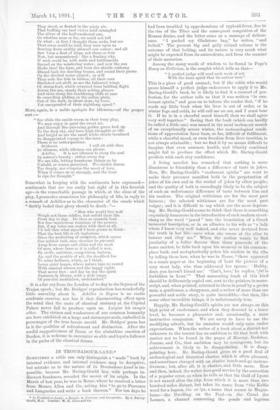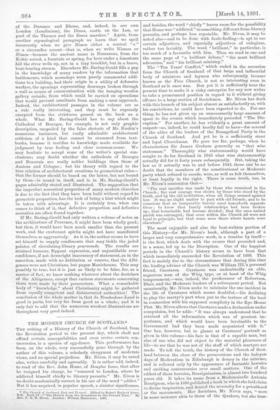IN TROUBADOUR-LAND.*
SOMETIMES a critic can only distinguish a " made " book by internal evidence, and internal evidence may be deceptive; but mistake as to the nature of In Troubadour-Land is im- possible, because Mr. Baring-Gould has, with perhaps in- discreet frankness, revealed the secret of its origin. In the March of last year, he was in Rome, where he received a letter from Messrs. Allen and Co., asking him "to go to Provence and Languedoc and write a book thereon." For ten days he " In Troubadour-Land ; a namable in Provence and Languedoc. By S, Baring- Gould, M.A. London; W. H. Anon and Oa,
bad been troubled by apprehensions of typhoid-fever, due to the rise of the Tiber and the consequent congestion of the Roman drains, and the letter came as a message of deliver- ance. " I packed my Gladstone bag," he writes, " and bolted." The present big and gaily attired volume is the outcome of that bolting, and its nature is very much what. might be expected from its antecedents, and from the manner of their narration.
Among the many words of wisdom to be found in Pope's Essay on Criticism, is the couplet which tells us that— "A perfect judge will read each work of wit
With the same spirit that its author writ."
This is a piece of good counsel ; but if the critic who would prove himself a perfect judge endeavours to apply it to Mr. Baring-Gould's book, he is likely to find it a counsel of per- fection, for the author tells us that it was written "in exu- berant spirits," and goes on to inform the reader that, " if he reads my little book when his liver is out of order, or in winter fogs and colds, he will call me an ass, and I must bear. it. If he is in a cheerful mood himself, then we shall agree• very well together." Seeing that the book (which can hardly be called. a little one) was issued in the most inclement month of an exceptionally severe winter, the meteorological condi- tions of appreciation have been, so far, difficult of fulfilment,. while a cheerful mood, or even freedom from liver troubles, is not always attainable ; but we find it by no means difficult to, imagine that even summer, health, and hilarity combine& might fail to produce the effect which Mr. Baring-Gould predicts with such airy confidence.
A living novelist has remarked that nothing is more disastrous to friendship than a difference of taste in jokes. Now, Mr. Baring-Gould's " exuberant spirits " are wont to make their presence manifest both in the perpetration of jokes of his own and in the recital of jokes by other people „ and the quality of both is exceedingly likely to be the subject of such an unfortunate difference of taste between him and his readers. The original witticisms are for the most part fatuous ; the selected witticisms arc for the most part vulgar ; and it is difficult to say which are the more depress- ing. Mr. Baring-Gould seems to think that there is something exquisitely humorous in the introduction of such modern street-• slang as the word " jawed " into the translation of a Greek memorial inscription, or in an allusion to his wife as " a lady. whom I know very well indeed, and who never deviated from the truth in her life—save when she swore at the altar to. honour and obey me." When the author wants to find. jocularity of a fuller flavour than these proceeds of the
market, he falls back upon his memory or his common- place book, and metaphorically pokes his readers in the ribs by telling them how, when he was in Rome, "there appeared in a comic paper at the beginning of Lent the picture of a very stout lady, who thus addressed. her spouse : Hubby,
dear, you haven't kissed me.' Can't, love,' he replies, 'fat is- forbidden in Lent.' " That nauseating trash of this kind should be deliberately copied out, sent to the printers in manu- script, and, when printed, returned to them in proof by a grown man, a gentleman, a clergyman, and a writer of more than one powerful and noble story, is quite incredible,—hat then, like- some other incredible things, it is unfortunately true.
Happily, Mr. Baring- Gould's spirits are not always on this high point of exuberance, and when they descend to a lower level, he becomes a pleasanter and, occasionally, a more instructive companion. We are sorry to have to use the modifying adverb, but its omission would only raise undue expectations. When the writer of a book about a district not unknown to the tourist has an ambition to fill that book with matter not to be found in the pages of Murray, Baedeker, Joanne, and Co., that ambition may be courageous, but its. achievement is likely to be disappointing. It is disap pointing here. Mr. Baring-Gould gives us a good deal of archaeological and historical chatter which is often pleasant, and sometimes charged with an elusive touch-and-go instruc- tiveness ; but, after all, it is chatter, and little more. Now and then, indeed, the writer does good service by the correction of a popular error, as when he tells us that the Gulf of Lyons is not named after the city, from which it is more than two hundred miles distant, but takes its name from "the Keltic word for a lagoon, /tin, or lyn, a name that recurs in Mague- lonne—the Dwelling on the Pool—in the Canal des. Lonnes, a channel connecting the ponds and lagoons.
of the Durance and Rhone, and, indeed, in our own London (Londinium), the Dinas, castle on the Lon, or pool of the Thames and the Essex marshes." Again, from another etymological paragraph we learn that we spell incorrectly when we give Nimes either a central " s " or a circumflex accent—that is, when we write Nismes or Nimes—because the ancient name is Nemansus, from the Keltic naimh, a fountain or spring, for here under a limestone hill the river wells up, not in a tiny brooklet, but in a brave, boat-bearing stream. Elsewhere Mr. Baring-Gould fills a gap in the knowledge of many readers by the information that battlements, which nowadays seem purely ornamental addi- tions to a building, had their origin in a utility of defensive warfare, the openings representing doorways broken through a wall as means of communication with the hanging wooden gallery outside, from which could be carried on operations that would prevent assailants from making a near approach. Indeed, the architectural passages in the volume are as a rule really interesting, and they must be expressly excepted from the strictures passed on the book as a whole. What Mr. Baring-Gould has to say about the 'Cathedral of Bourges, for example, is not only graphic description, unspoiled by the false rhetoric of Mr. Ruskin's numerous imitators, but really admirable architectural criticism of a kind that cannot be crammed from text- books, because it testifies to knowledge made available for judgment by true feeling and clear common-sense. We may hesitate to accept some of the writer's special con- clusions; may doubt whether the cathedrals of Bourges and Beauvais are really nobler buildings than those of Amiens and Cologne ; but his theory with regard to the true relation of architectural creations to geometrical rules— that the former should be based on the latter, but not bound by them—is sound in itself, and is in Mr. Baring-Gould's pages admirably stated and illustrated. The suggestion that the imperfect acoustical properties of many modern churches is due to the fact that they have been built without regard to geometric proportion, has the look of being a hint which might be taken with advantage. It is certainly true, when one comes to think of it, that defective proportion and defective acoustics are often found together.
If Mr. Baring-Gould had only written a volume of notes on the architecture of Provence, it might have been wholly good; but then, it would have been much smaller than the present -work, and the exuberant spirits might not have manifested themselves so aggressively. As it is, the author seems to have act himself to supply condiments that may tickle the jaded palates of circulating-library gourmands. The resUlts are strained humour, flippant expression, and unjustifiable over- confidence, if not downright inaccuracy of statement, as in the assertion, made with no dubitation or reserve, that the Albi- genses were not Christians, but pagan Manichwans. This may possibly be true, but it is just as likely to be false, for, as a matter of fact, we know nothing whatever about the doctrines of the Albigenses, except that various statements concerning them were made by their persecutors. What a remarkable body of " knowledge " about Christianity might be gathered from equally competent and disinterested authorities ! The conclusion of the whole matter is, that In Troubadour-Land is good in parts, but very far from good as a whole; and it is only fair to add that the numerous woodcut illustrations are throughout very good indeed.



































 Previous page
Previous page